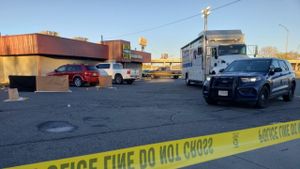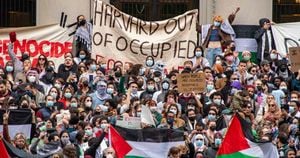The mastermind behind a notorious bomb plot from the height of the 2019 anti-government protests in Hong Kong was sentenced to nearly 24 years behind bars, marking a significant moment under the city's anti-terrorism legislation. Ng Chi-hung received 23 years and 10 months for his role in the foiled attack, which aimed at targeting police officers during one of the largest waves of dissent the region had seen since its return to Chinese control.
This bomb plot is notable not only for its violent intent but also for being the first prosecution of its kind under the newly enacted United Nations (Anti-Terrorism Measures) Ordinance. This law was established by Hong Kong's government as part of its commitment to global security measures, particularly following the tragic September 11 attacks in 2001.
During his sentencing on Thursday, Judge Judianna Barnes painted Ng’s actions as “vicious” and claimed they represented “a declaration of war on society.” Her remarks were underscored by the violent backdrop of the December 8 plot, where Ng and six other conspirators planned to plant bombs along the route of the protest rally and shoot at officers, potentially leading to devastating casualties.
Although Ng and his group were not prominent figures within the larger pro-democracy movement, their case drew considerable scrutiny due to the implementation of anti-terror laws, raising questions about the broader implications for civil liberties and political dissent within Hong Kong. Prosecutors revealed during the trial's proceedings how the accused had affiliations with two extremist organizations, one of which was the “Dragon-Slaying Brigade” led by Wong Chun-keung, who received more than 13 years as part of the collective sentences handed down to the group.
The attempt to execute the bombing came during an intensely turbulent period for Hong Kong, characterized by widespread protests sparked by proposed legislation allowing extradition to mainland China. This political climate led to significant unrest and numerous allegations of police brutality, frustrations and fears of encroachments on freedoms long enjoyed by residents of the semi-autonomous region.
Ng pleaded guilty to charges of conspiring to commit the bombing, which also included possession of arms with the intent to endanger life. He was one of seven convicted defendants, who collectively received prison sentences ranging from just under six years to more than 13 years, depending on their roles within the conspiracy.
Interestingly, six other defendants who participated and pleaded not guilty were acquitted of all charges earlier this year—adding another layer of complexity to the legal and social narratives surrounding these events.
Police chief Steve Li commented on the moral ground of the convicted individuals, describing their motivations as “deranged,” and suggested he would evaluate the possibility of appealing certain sentencing decisions made by the court. This rhetoric reflects the combative politicization of law enforcement perspectives during these times of strife.
The 2019 protests represented the most significant challenge to the Hong Kong government since its return to Chinese sovereignty in 1997, resulting in over 10,000 arrests during the social turmoil, which was characterized by violence and political grievances. The catalyst was rooted deeply within the proposed extradition bill—an issue which, prompting fears of Chinese control and suppression, galvanized residents from all walks of life to join protests.
Even though the protests subdued with the withdrawal of the extradition bill, tensions remain palpable. Issues surrounding the use of the anti-terrorism laws and their application continue to raise alarms among human rights advocates and organizations, questioning whether these laws unjustly target political dissenters under the guise of maintaining national security.
The aftermath of the trials continues to influence the weighing of legal and moral weights within Hong Kong, as the city entrenches itself within the wider geopolitical rift between China and the West. The ramifications of these sentences will likely play out over the coming months as citizens grapple with the intended—and unintended—consequences of heightened security laws on their everyday lives.
This situation reflects broader social fractures within Hong Kong society as activists, ordinary citizens, and the government navigate the balancing act between national security and individual rights. The world watches closely to see how these developments will shape the future of civil liberties, political discourse, and community cohesion within this vibrant yet tumultuous region.



